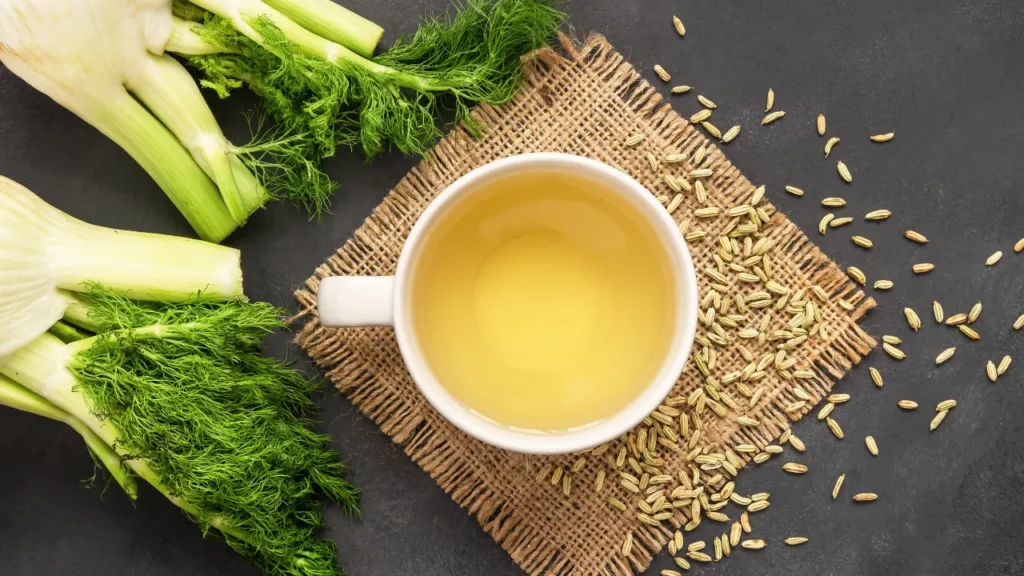The perennial herb known as water fennel, or oenanthe aquatica, is a member of the apiaceae family and is typically found in wetlands like marshes, ponds, and ditches in Europe and some regions of Asia. Many ancient civilizations have historically used this aquatic plant for its possible health advantages, such as its antioxidant, anti-inflammatory, and antibacterial properties. The characteristics, health advantages, recommended dosage, negative effects, possible drug interactions, and recommendations for appropriate use of water fennel as a nutritional supplement are all thoroughly documented in this article.
You May Also Like:
Enhance Mental Agility: 3 Big Benefits of Omega-3s for Cognitive Function
Battle of the Brain Boosters: Brain MD Omega 3 Power vs. Kori Krill Oil Mind & Body
Water Fennel: Benefits, Dosage, Side Effects, Drug Interactions, And Other Important Information is an original (NootropicsPlanet) article.
Nature of Water Fennel
Water fennel is an herbaceous plant with a height of up to one meter, and it is distinguished by its pinnately split leaves with linear leaflets and its clusters of tiny, white blooms that resemble umbrellas. The plant survives well in freshwater with flooded soils. Water fennel’s therapeutic benefits are a result of a range of bio-active substances found in its roots, leaves, and fruits, including flavonoids, coumarins, and essential oils.
Health Benefits of Water Fennel
1. Antioxidant Properties: Flavonoids, a type of plant chemicals known for their strong antioxidant properties, are abundant in water fennel. Free radicals are unstable molecules that can induce oxidative stress and contribute to many chronic diseases, including cancer, cardiovascular disease, and neurological disorders. These substances have the ability to neutralize free radicals. Water fennel can promote general health and shield the body from oxidative damage by scavenging free radicals.
2. Anti-inflammatory Effects: The bio-active components of water fennel, especially its essential oils, have strong anti-inflammatory effects. Although persistent inflammation can cause a number of health problems, including diabetes, cardiovascular disease, and arthritis, it is a normal immunological response. Water fennel can help manage these diseases and enhance general health by lowering inflammation.
3. Antibacterial Activity: A variety of pathogenic microorganisms, such as bacteria, fungi, and viruses, have been shown to be resistant to water fennel’s antibacterial properties. This activity is assumed to be caused by the plant’s essential oils, which function as natural antibacterial agents that can help safeguard the body against infections and support the immune system.
4. Hepatoprotective Effects: Research suggests that water fennel can have hepatoprotective effects that guard the liver against harm brought on by toxins. Water fennel can help the body’s natural detoxification procedures and advance overall health by supporting liver health.

Chemistry of Water Fennel
Diverse bio-active substances found in water fennel contribute to its medicinal benefits. The following are the main chemical components of water fennel:
1. Flavonoids: These are a class of polyphenolic substances that have strong antioxidant properties. Quercetin, kaempferol, and apigenin are three flavonoids included in water fennel that scavenge free radicals and shield the organism from oxidative stress.
2. Coumarins: The coumarins in water fennel, like osthole, imperatorin, and isoimperatorin, have a variety of pharmacological properties, including hepatoprotective and anticoagulant properties.
3. Essential Oils: Water fennel contains volatile oils that contribute to its antibacterial and anti-inflammatory properties as well as its distinctive aroma. Several terpenes, including limonene, -pinene, and -myrcene, make up these oils.
Physiological Properties of Water Fennel
The synergistic action of water fennel’s many bio-active components is responsible for its health advantages. Some of the physiological mechanisms through which water fennel exerts its therapeutic effects are as follows:
1. Antioxidant Properties: Flavonoids in water fennel can neutralize free radicals by donating electrons, stabilizing these reactive molecules and reducing oxidative damage to biological components like DNA, proteins, and lipids.
2. Anti-inflammatory Effects: water fennel essential oils can reduce the activity of enzymes like cyclooxygenase (COX) and lipoxygenase (LOX), which inhibit the formation of pro-inflammatory mediators including cytokines and prostaglandins. This reduces inflammation and can treat inflammatory-related disorders.
3. Antimicrobial Properties: The essential oils in water fennel can undermine the integrity of bacterial cell walls and membranes, causing cellular contents to leak and cell death. Furthermore, by interfering with cell wall production and affecting membrane permeability, these oils can limit fungal cell development.
4. Coumarins: These substances found in water fennel can protect the liver from damage by increasing the activity of antioxidant enzymes including superoxide dismutase (SOD) and catalase (CAT). These enzymes protect liver cells from oxidative injury by neutralizing reactive oxygen species (ROS). Coumarins can also suppress the activation of hepatic stellate cells, which play a role in liver fibrosis, reducing the advancement of liver disorders.

Optimal Dosage of Water Fennel
The recommended dosage of water fennel as a dietary supplement varies depending on factors such as your age, weight, and your specific health situation. Water fennel currently has no set recommended daily allowance (RDA). A typical rule of thumb is to begin with a low dose, such as 300-500 mg of dry water fennel extract daily, then gradually raise the quantity to measure tolerance and attain the desired benefits. Before beginning any new supplement regimen, it is critical to contact a healthcare practitioner, especially if you have pre-existing medical conditions or are taking medications.
Side Effects of Water Fennel
When consumed in proper doses, water fennel is generally regarded safe. However, you may develop side effects such as stomach discomfort, diarrhea, or allergic responses, especially if you take it in large amounts. If you encounter any negative side effects while taking water fennel, you should stop using it and consult a healthcare practitioner.

Potential Substance Interactions with Water Fennel
Water fennel can interact with some drugs and substances, resulting in decreased efficacy or an increased risk of negative effects. Among the probable interactions are:
1. Anticoagulants and anti-platelet Drugs: Coumarins in water fennel have blood-thinning effects. There is a risk of increased bleeding when combined with anticoagulant or anti-platelet drugs such as warfarin, heparin, or aspirin. Before using water fennel, visit a healthcare practitioner if you are using any blood-thinning drugs.
2. Diuretics: Water fennel has diuretic properties, boosting urine production and possibly augmenting the effects of diuretic drugs. It is recommended that you contact a healthcare practitioner before using water fennel if you are using diuretics or have a history of renal difficulties.
3. Hypoglycemic Agents: Some research suggests that water fennel has hypoglycemic properties, which can reduce blood sugar levels. When combined with blood sugar-lowering drugs such as insulin or oral hypoglycemic treatments, there is a danger of synergistic effects leading to hypoglycemia. If you are taking diabetes drugs, you should monitor your blood sugar levels and speak with a healthcare expert.
Best Responsible Uses of Water Fennel
Consider the following tips to guarantee the safe and responsible use of water fennel as a nutritional supplement:
1. Before beginning water fennel supplementation, see a healthcare practitioner, especially if you have pre-existing medical issues or are using drugs.
2. Begin with a low dose of 300-500 mg dry water fennel extract daily, gradually increasing the dose to determine tolerance and achieve the desired benefits.
3. Keep an eye out for side effects such as stomach discomfort, diarrhea, or allergic reactions. If you suffer any negative side effects, stop using it and consult a doctor.
4. Be cautious of potential substance interactions and alter other medications’ dosages accordingly while under the supervision of a healthcare expert.
5. To assure safety, performance, and purity, use high-quality water fennel supplements from trustworthy producers.
Water Fennel:
Conclusion
Water fennel has many beneficial health properties, but due to the limited research conducted and the fact that there is no standard recommended dose to take, it is crucial to get expert advice on taking it. There are also side effects that you need to keep in mind, especially when it comes to the digestive system. If you are interested in taking a water fennel supplement, speak to your doctor.

References:
- Antioxidant activity and phytochemical analysis of fennel seeds and flaxseed
- Foeniculum vulgare Mill: A Review of Its Botany, Phytochemistry, Pharmacology, Contemporary Application, and Toxicology
- In addition, fennel shoots, leaves, and steams also possess the antioxidant potential that was measured by Barros, Heleno, Carvalho, and Ferreira (2009).
Important Note: The information contained in this article is for general informational purposes only, and should not be construed as health or medical advice, nor is it intended to diagnose, prevent, treat, or cure any disease or health condition. Before embarking on any diet, fitness regimen, or program of nutritional supplementation, it is advisable to consult your healthcare professional in order to determine its safety and probable efficacy in terms of your individual state of health.
Regarding Nutritional Supplements Or Other Non-Prescription Health Products: If any nutritional supplements or other non-prescription health products are mentioned in the foregoing article, any claims or statements made about them have not been evaluated by the U.S. Food and Drug Administration, and such nutritional supplements or other health products are not intended to diagnose, treat, cure, or prevent any disease.


